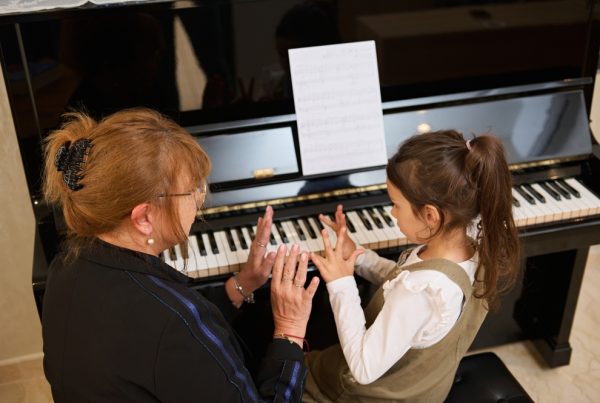Parents who search for piano teachers at home want the academic, social, and creative advantages of music study without the stress of weekly commutes. Research led by the National Institutes of Health shows that steady music training strengthens children’s auditory-processing skills and promotes long-term brain development. Volz Piano brings those benefits straight to Utah living rooms by blending its Complete Volz Piano Method with a “Piano Teachers That Drive to You” service that meets every child at their own piano bench.
Table of Contents
- Why Choose Piano Teachers at Home for Kids?
- Inside the Complete Volz Piano Method
- How the Mobile Lesson Model Works in Utah
- Preparing Your Home for Lessons
- Finding the Best At-Home Piano Teacher Near You
- Costs, Scheduling, and Expected Progress
- Blending Suzuki Principles with the Volz Approach
- Parent Tips for One-on-One Lessons at Home
- Building Lasting Practice Habits
- FAQs
Why Choose Piano Teachers at Home for Kids?
The National Association of Independent Schools highlights that early music exposure boosts language, emotional grounding, and sensory integration. At the same time, an American Psychological Association brief reports that childhood lessons can foster lifelong cognitive flexibility. By choosing kids’ piano lessons at home, families remove travel fatigue, making it easier for children to arrive focused and eager.
Utah’s own Fine Arts Core Standards rank music alongside math and literacy for nurturing creativity and problem-solving. When in-home piano lessons plug directly into that framework, students reinforce school goals while enjoying an art form they love.
Inside the Complete Volz Piano Method
The Complete Volz Piano Method blends traditional reading, ear-training games, and composition exercises so beginner piano lessons at home for kids aged 5-12 progress naturally from rote to notation. Volz teachers tailor repertoire to spark curiosity, mirroring insights from Harvard Gazette researchers who note that engagement—not rote IQ drills—builds self-esteem and discipline.
Because the teacher witnesses home routines each week, they can adjust pacing instantly, a major advantage over studio settings for one-on-one piano lessons at home for young children.
How the Mobile Lesson Model Works in Utah
A mobile piano teacher for kids arrives with method books, rhythm cards, and portable keyboards when needed. This “drive-to-you” service aligns with findings from the National Endowment for the Arts, which underscores that sustained lessons—regardless of location—produce enduring benefits. Families often stack siblings back-to-back, turning a single evening into a mini studio without leaving home.
Parents Googling “piano teacher drive-to-you service for children” also appreciate the flexibility during Utah’s snowy months when road conditions can cancel studio lessons.
Preparing Your Home for Lessons
Choose the Right Instrument
A weighted 88-key digital piano works for the first several years, but an acoustic piano offers richer touch and tone that, according to Harvard Health Publishing, deepens neural connections linked to emotional regulation.
Optimize Lighting and Ergonomics
Set the bench so elbows fall level with keys and position a lamp to avoid shadows. Proper setup reduces strain and encourages longer focus spans, echoing recommendations from the American Academy of Pediatrics to keep digital and physical tasks ergonomically sound.
Design a Distraction-Free Practice Corner
Reserve a quiet nook for the piano and store books in easy reach. According to the National Association for Music Education, visible instruments increase spontaneous practice and reinforce identity as a young musician.
Finding the Best At-Home Piano Teacher Near You
When hunting for the best at-home piano teacher for kids near me, verify:
- Credentials & Safety – Look for degrees or recognized pedagogy certificates and current background checks. Tips from the Parents Magazine experts stress that qualified teachers understand child development and technique.
- Teaching Philosophy – Ask how they balance reading, ear work, and creative projects. Autonomy boosts motivation, confirms an APA education brief.
- Adaptability – Great private piano tutor at home candidates pivot restless moments into rhythm games, a tactic endorsed by Colourful Keys for keeping young learners engaged.
Costs, Scheduling, and Expected Progress
Affordable in-home piano lessons for children in Utah generally run $40–$60 per half-hour. Consistent weekly slots foster habit formation; a recent habit-formation study suggests predictable contexts boost compliance by 65 percent.
Children typically move through early method books in 6–12 months. Progress accelerates when families align lessons with school calendars and limit conflicting activities.
Blending Suzuki Principles with the Volz Approach
The in-home Suzuki piano lessons for kids philosophy starts with listening, mirroring language acquisition. A comparison by Montreal Piano Lessons explains that ear-first learning builds musical intuition before notation. Volz Piano integrates Suzuki pieces for students who thrive on pattern imitation, then transitions to reading so kids gain full literacy.
Parent Tips for One-on-One Lessons at Home
Be Supportive, Not Hovering
The Music & Arts educator series notes that granting children choice and autonomy fuels motivation.
Celebrate Small Wins
Mini-recitals for grandparents or video journals turn kids piano instructor in-home milestones into lasting memories and keep enthusiasm high.
Use Tech Wisely
Screen-based practice apps are fun, but the AAP and child-development experts urge balanced media habits to protect sleep and focus.
Building Lasting Practice Habits
Use “practice bingo” charts or sticker rewards inspired by Colourful Keys to transform daily routines into games. Start with five-minute targets and extend gradually; even brief sessions spark neuron growth, say neuroscience reviews.
FAQs Piano Teachers at Home
How long should beginners practice each day?
Start with 5–10 focused minutes, then add time as stamina improves.
Is a digital keyboard okay?
A weighted 88-key digital piano is fine for the first few years; add a sustain pedal for authentic touch.
What age is best to start?
Many children begin between ages 4 and 7 when they can focus and count to four.
How do mobile teachers keep quality high?
They bring curated materials, follow structured curricula like the Volz Method, and adapt to each child’s pace.
Do parents need musical experience?
No. Your role is to set routines, celebrate progress, and communicate with the teacher.



